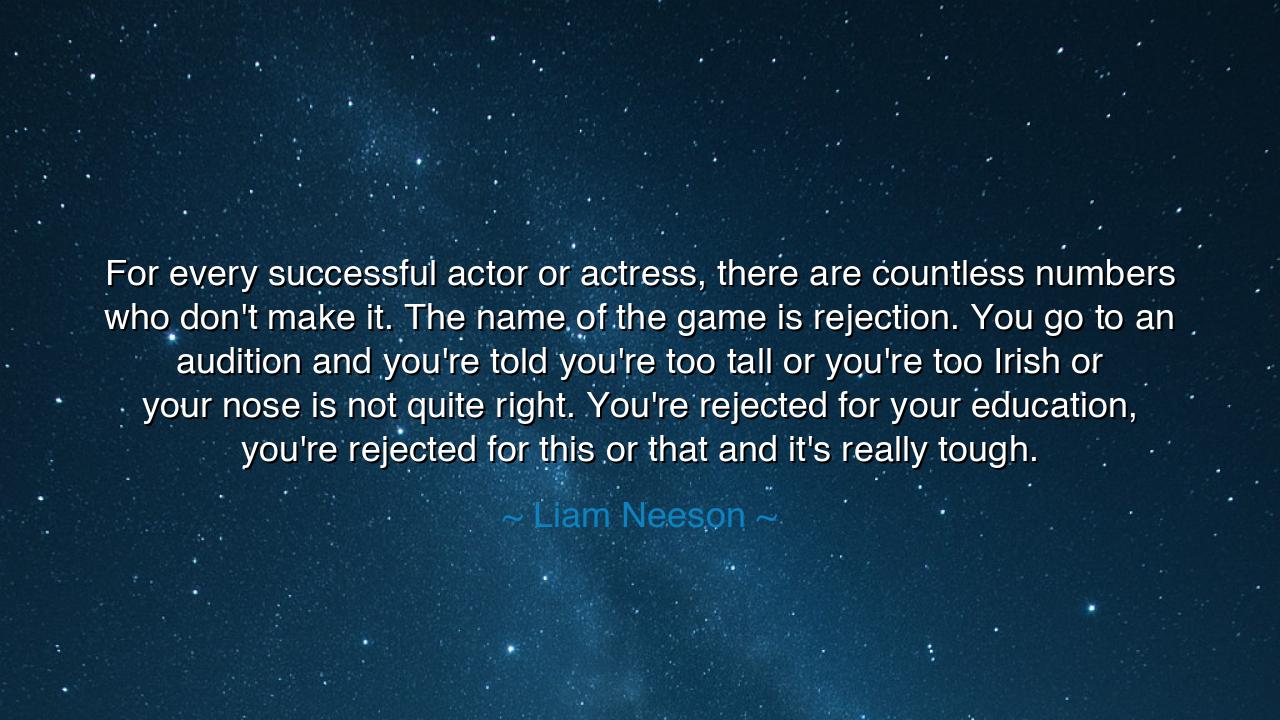
For every successful actor or actress, there are countless
For every successful actor or actress, there are countless numbers who don't make it. The name of the game is rejection. You go to an audition and you're told you're too tall or you're too Irish or your nose is not quite right. You're rejected for your education, you're rejected for this or that and it's really tough.






The actor Liam Neeson, whose voice carries both gravitas and grace, once said: “For every successful actor or actress, there are countless numbers who don't make it. The name of the game is rejection. You go to an audition and you're told you're too tall or you're too Irish or your nose is not quite right. You're rejected for your education, you're rejected for this or that and it's really tough.” Though these words are born from the world of theater and film, they reach far beyond it — into the heart of every person who has ever struggled, failed, and risen again. In them lies a universal truth: that rejection is not the end of the path, but the fire through which character is forged.
To the ancients, rejection was not shameful but sacred. They saw it as the trial that separates the strong from the faint-hearted, the purposeful from the unprepared. The great philosopher Seneca wrote that “fire tests gold, and adversity tests brave men.” Neeson’s words are the modern echo of this old wisdom. He speaks as one who has walked through those fires — auditions lost, roles denied, dreams delayed — and yet endured. For what he describes is not merely the rejection of an actor, but the universal struggle of the human spirit against judgment, failure, and doubt.
In the realm of art, as in life, rejection is the teacher that no one desires, yet everyone must face. The young actor enters a room full of strangers, heart pounding, dreams alive, and leaves empty-handed. Yet in that emptiness, something is born — resilience, humility, the quiet understanding that one’s worth is not determined by approval. Every “no” becomes a silent mentor, whispering: try again, refine your craft, strengthen your soul. The ancients would have called this process the discipline of the spirit — the transformation of rejection into wisdom.
Consider the story of Vincent van Gogh, who in his lifetime sold only one painting, and was dismissed by critics as mad and untalented. Yet he painted on — driven not by recognition, but by inner necessity. The world rejected him, but time revealed his greatness. His story, like Neeson’s teaching, reminds us that rejection is often not a verdict of failure, but a delay in understanding. The world may not always see one’s worth immediately, but the soul must not cease to believe in its own calling. Persistence in the face of rejection is the truest test of purpose.
When Neeson says, “You’re told you’re too tall or too Irish or your nose is not quite right,” he is revealing the absurdity of external judgment. The world is often blind to substance, seeing only form. People are rejected not for lack of talent or truth, but for failing to fit into narrow expectations. Yet history has shown that it is often the misfits, the outcasts, the rejected who later redefine the standards of greatness. For what matters is not being chosen by others, but being chosen by purpose. The hero, after all, is never born from ease, but from exclusion.
The quote also reminds us of the deep emotional cost of rejection. It is, as Neeson says, “really tough.” To hear “you are not enough” again and again is to face the temptation of surrender. But it is precisely here that strength must rise — not the strength of defiance, but the strength of patience. The one who endures rejection learns to separate their self-worth from the opinions of others. They come to understand that the journey is not about being accepted by the world, but about becoming true to oneself.
In this, Neeson’s wisdom carries the echo of the ancient stoic and warrior philosophy: that struggle refines the soul. The actor who faces a hundred rejections before success is not defeated — they are tempered. Their eventual triumph carries weight because it has been earned through endurance. Rejection, in this sense, becomes a sacred rite of passage, the doorway through which every artist, leader, or dreamer must pass before touching greatness.
The lesson of Liam Neeson’s words is therefore timeless and universal. Whether one is an actor, a craftsman, a scholar, or a dreamer, rejection will come — often, and without mercy. But those who persevere through it are the ones who transform it into strength. Let every failure be a lesson, every rejection a rehearsal for resilience. Do not measure your worth by applause, but by your persistence. For those who continue to rise after being cast down, who create even when unchosen, who love their craft more than the reward — they are the ones who, in the fullness of time, will leave a mark that no rejection can erase.
So, remember these words, O seeker of purpose: rejection is not the end — it is the beginning of mastery. Accept it, learn from it, and rise stronger. For the path to greatness has always been paved with the stones others once threw away.






AAdministratorAdministrator
Welcome, honored guests. Please leave a comment, we will respond soon